 












Promotional
Team Favorites
Lodging food and more







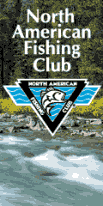

|
The need for speed
By JOHN KOLINSKI
Mid-summer walleye fishing can be slow on many bodies of water.
Despite a fish's need to eat more as water temperatures warm and activity
increases as they search and follow forage, walleyes can become increasingly
difficult to put in the boat or on the dinner table.
One reason is that nomadic existence. Despite the tendency to school
in
larger groups during the hot-weather months, those walleyes will travel
far
and wide to keep their bellies full. Another reason is the smorgasboard
of
available food. By now, a walleye's diet can include everything from
worms
and grubs to baitfish, panfish, crawdads, salamanders, frogs and who
knows
what else.
That makes it tougher to tempt and fool those fish in locations with
tremendous diversity and numbers within the forage base.
One solution is to fish massive bodies of water like the Great Lakes
where
walleyes have a harder time pinning down baitfish and remain eager
to eat
what anglers have to offer. A handful of other lakes, most notably
Mille Lacs
in Minnesota, have so many mature walleyes that the competition for
food
keeps the fish snapping at nearly anything that comes their way.
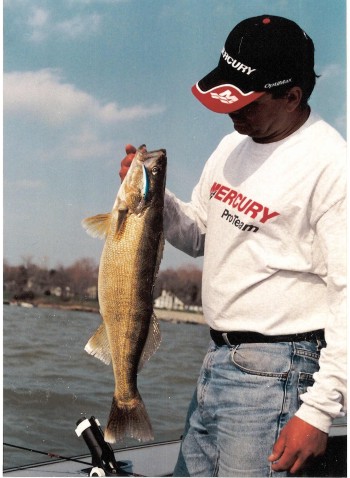 |
Those are exceptions. In most of our waters, the fishing simply slows
down. That's when I pick up the pace to put the hammer down on those
waffling
walleyes. It's effective for two main reasons -- because it produces
reaction
strikes from fish that are not actively searching for food and because
it
allows the angler to cover far more water and, in turn, contact as
many
cooperative walleyes as possible. |
Often, it's not as difficult to find these fish as it is to catch them.
The
key is locating the schools of baitfish. On many river systems, the
edges of
the main channels are good starting points. In lakes and reservoirs,
large
concentrations of baitfish gang up on specific structure like reefs,
humps
and flats.
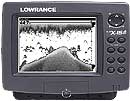
Lowrance’s
new X-15 |
Quality electronics like the Lowrance X-15 unit will show you where
the baitfish are hanging out. When you find them along a river channel,
lead-core line and shad-bodied crankbaits like Storm's Lightnin'
Shad and Rapala's Shad Raps can be a
dynamite approach. |
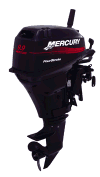
Mercury
9.9 h.p |
However, instead of pulling them along at 3-4 mph, I crank up my Mercury
four-stroke kicker and run them at 4-5 mph in search of reaction bites.
If they're bumping the bottom now and then, I know the lures are
running where I want them.Perhaps the most important element of this presentation
is keeping those crankbaits tuned to run straight at higher speeds.
Lures that ran fine at 2
mph will sometimes spin or kick out to the side at 4 mph. Not only
will the fish refuse to touch them, but some major tangles can also occur. |
Tuning cranks is a matter of dropping them into the water alongside the
boat
and testing them at the speed you plan to troll. If they don't pull
in a
straight line, bend the eye on the lip or nose of the bait in or out
until
they run true. Keep in mind that changes in boat direction will increase
the
speed of the lures on one side of the boat, so pull them aggressively
forward
when tuning to make sure they continue to run straight.
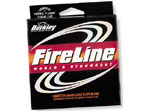 |
The weight of lead-core line is a definite advantage when speed-trolling
cranks. It will keep a properly tuned bait on a straight line far better
than mono or Fireline. I've found 27-pound test a good weight for
most of my needs, and I add a 10-foot Fireline leader for sensitivity,
maximum lure action and a little stealth that straight lead line can't
provide. |
Another common situation in mid-summer finds walleyes suspended among schools
of baitfish in lakes and reservoirs. Again, they can be next-to-impossible
to catch with standard presentations. Pull something past them that looks
just slightly different or more colorful than what they've been eating
and many times they will chase it down and inhale it.Two approaches work
well for these fish. If the fish are in 15 feet of water or less, Fireline
will take your lures to any depth within the column and provide a long-lining
presentation that can be important for spooky fish in clear or flat water.
Planer boards are a second option and can be used with either monofilament
or Fireline, although using them with Fireline requires special clips that
help
the boards hold the line securely at the speeds you'll want to run.
Off-Shore
boards equipped with the spring-loaded Tattle Flags are an added advantage
because they'll let you know if you pick up any debris or extremely
small
fish along the way.When the water gets rough, the planer boards go
back in the storage compartment and long-lining is the right call.
I've also found that the old "match the hatch" theory doesn't always
hold
true with these nomadic, mid-lake walleyes. If they've been looking
at shad
for days on end, sometimes a crankbait with a different profile is
the
ticket. I've had good success at times pulling Storm Thundersticks
in such
situations.
Weeds and flooded stump fields attract summertime walleyes, as well,
and
burning smaller shad baits over the tops of them will often draw them
out of
the cover and put them into the livewell. When weather permits, planer
boards
are the ticket for this situation.
Before you give up on your favorite walleye lake during these dog days
of
summer, try a little speed-trolling. It can be your ticket to some
fast
action close to home.
E-mail
John Kolinski

Fish
Clix Banner Exchange
Walleyes Inc. website is maintained
by Randy
Tyler Fishing the In-Fisherman Professional Walleye Circuit, Masters
Walleye Circuit and the Team Walleye Circuit. All rights reserved.Copyright
1999/2002
Please visit these site sponsors
Daiichi/Tru-Turn Hooks,
Lindy
Little Joe,
R-A.M Mounting Systems,
Ranger
boats, Mercury Outboards,
Bedford
Sales , Church Tackle, Panther
Marine Products,
Webfoots body sock,
Bait
Rigs Tackle ,Dual Pro Charging Systems,
Daiwa Rods and Reels,
Driftcontrol
Wind socks,
Trojan Batteries
|





